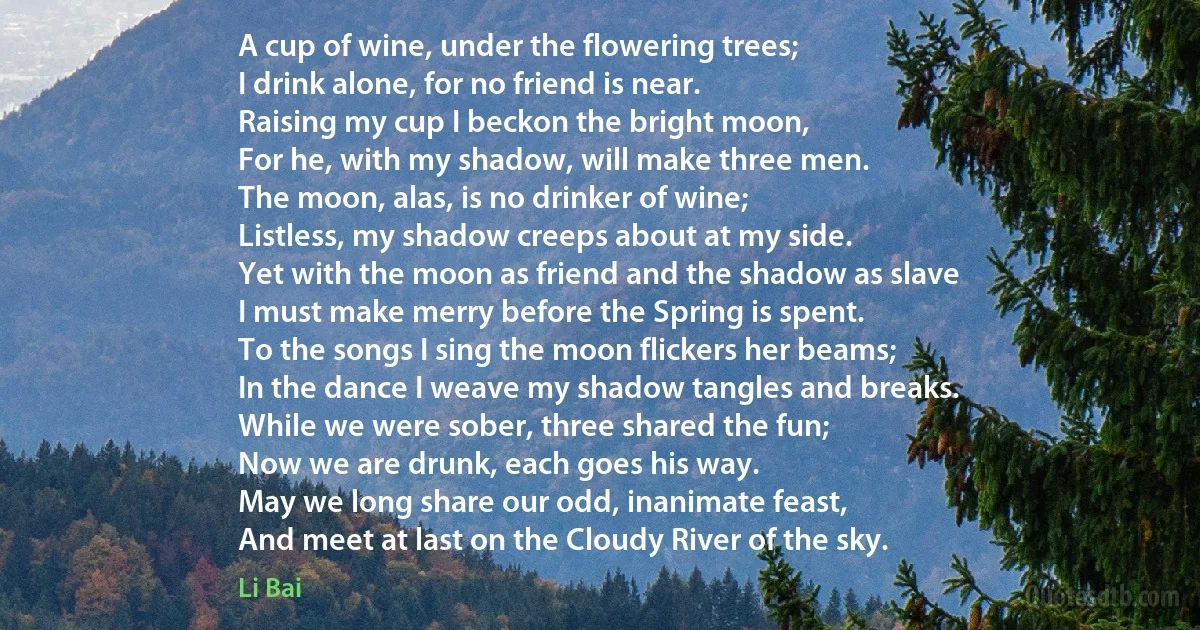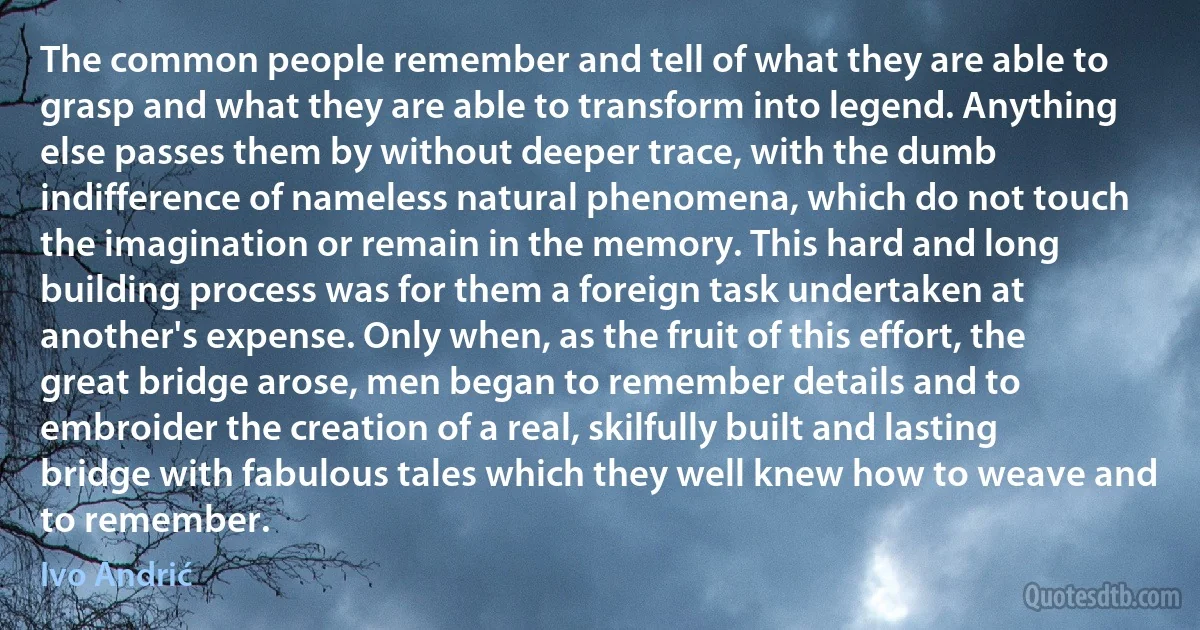Weave Quotes - page 6
After the Spaniards settled the Southwest, the Navajo began another burst of cultural borrowing-or, more actually, stealing. Spanish ranches and villages were so depleted of horses-not to mention sheep-that by 1775 the Spaniards had to send to Europe for 1,500 additional horses. After the Pueblo Rebellion against the Spaniards was put down in 1692, many Pueblo took refuge with their Navajo neighbors-and taught them how to weave blankets, a skill for which the Navajo are still noted, and to make pottery. During this time the Navajo probably absorbed many Pueblo religious and social ideas and customs as well, such as ceremonial paraphernalia and possibly the Pueblo class system.

Peter Farb
The city sleeps and the country sleeps, the living sleep for their time, the dead sleep for their time, the old husband sleeps by his wife and the young husband sleeps by his wife and these tend inward to me, and I tend outward to them, and such as it is to be of these more or less I am, and of these one and all I weave the song of myself.

Walt Whitman
Could I revive within me
Her symphony and song,
To such a deep delight 'twould win me,
That with music loud and long,
I would build that dome in air,
That sunny dome! those caves of ice!
And all who heard should see them there,
And all should cry, Beware! Beware!
His flashing eyes, his floating hair!
Weave a circle round him thrice,
And close your eyes with holy dread,
For he on honey-dew hath fed,
And drunk the milk of Paradise.

Samuel Taylor Coleridge
If every instrument could accomplish its own work, obeying or anticipating the will of others, like the statues of Daedalus, or the tripods of Hephaestus, which, says the poet, ‘of their own accord entered the assembly of the Gods'; if, in like manner, the shuttle would weave and the plectrum touch the lyre without a hand to guide them, chief workmen would not want servants, nor masters slaves.

Aristotle
Philosophy finds religion, and modifies it; and conversely religion is among the data of experience which philosophy must weave into its own scheme. Religion is an ultimate craving to infuse into the insistent particularity of emotion that non-temporal generality which primarily belongs to conceptual thought alone. In the higher organisms the differences of tempo between the mere emotions and the conceptual experiences produce a life-tedium, unless this supreme fusion has been effected. The two sides of the organism require a reconciliation in which emotional experiences illustrate a conceptual justification, and conceptual experiences find an emotional illustration.

Alfred North Whitehead
The productions of the earth require long and difficult preparations, before they are rendered fit to supply the wants of men.
The productions which the earth supplies to satisfy the different wants of man, will not, for the most part, administer to those wants, in the state nature affords them; it is necessary they should undergo different operations, and be prepared by art. Wheat must be converted into flour, then into bread; hides must be dressed or tanned; wool and cotton must be spun; silk must be taken from the cod; hemp and flax must be soaked, peeled, spun, and wove into different textures; then cut and sewed together again to make garments, &c. If the same man who cultivates on his own land these different articles, and who raises them to supply his wants, was obliged to perform all the intermediate operations himself, it is certain he would succeed very badly.

Anne Robert Jacques Turgot
Perhaps history this century, thought Eigenvalue, is rippled with gathers in its fabric such that if we are situated, as Stencil seemed to be, at the bottom of a fold, it's impossible to determine warp, woof, or pattern anywhere else. By virtue, however, of existing in one gather it is assumed there are others, compartmented off into sinuous cycles each of which had come to assume greater importance than the weave itself and destroy any continuity. Thus it is that we are charmed by the funny-looking automobiles of the '30's, the curious fashions of the '20's, the particular moral habits of our grandparents. We produce and attend musical comedies about them and are conned into a false memory, a phony nostalgia about what they were. We are accordingly lost to any sense of continuous tradition. Perhaps if we lived on a crest, things would be different. We could at least see.

Thomas Pynchon
above all to listen to young activists, whose fiery demands for social justice light up a new path today. They weave for all of us a garment of brightness. We surely need that light. For we live in an era of counter-revolution, when the gains made against racism during the 1960s-which I fought for alongside millions of other people-face constant assault.

Elizabeth Martinez
I'm convinced that, as great as that record sounds, if you had anyone else sing it, you know, anyone else try to kind of weave and make it do that thing where it burns like wildfire and it comes alive, no one else could do it. It's incredible the way she kind of brings this cold arctic atmosphere, It's just like fire, you know? It's like all aaarh coming out of her mouth. ... and now I'm listening to the song in my head. "Do you know what I really need? Do you know what I really need? I need lalalala yea yo yea yo your love."

Kate Bush
...You consciously weave certain things in. Then some things are unconsciously woven into the book, both because you write one poem at a time but also because the motivations for each poem exist within the world of that poem. They subconsciously transcend the world of that poem and go to other places...

Reginald Betts
Thou wert as a lone star, whose light did shine
On some frail bark in winter's midnight roar:
Thou hast like to a rock-built refuge stood
Above the blind and battling multitude:
In honoured poverty thy voice did weave
Songs consecrate to truth and liberty,-
Deserting these, thou leavest me to grieve,
Thus having been, that thou shouldst cease to be.

Percy Bysshe Shelley


